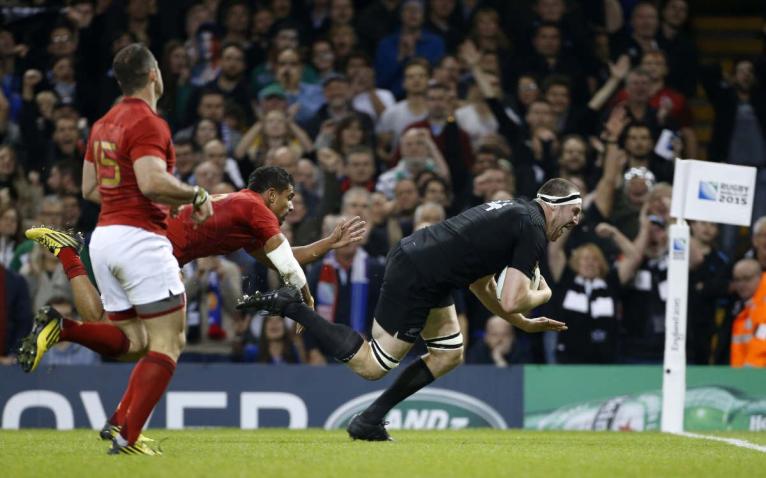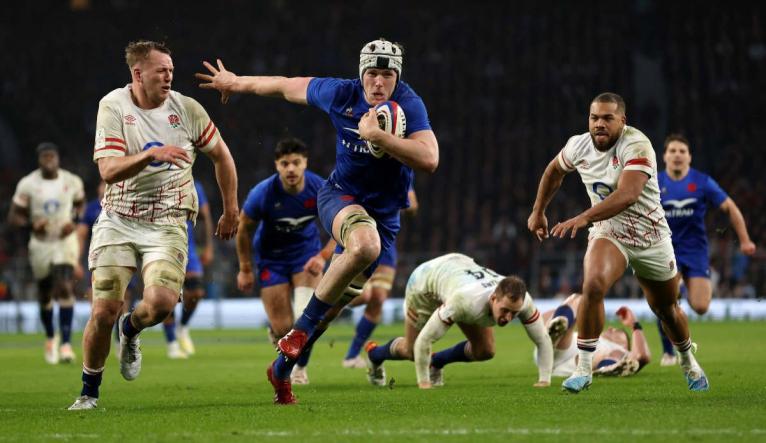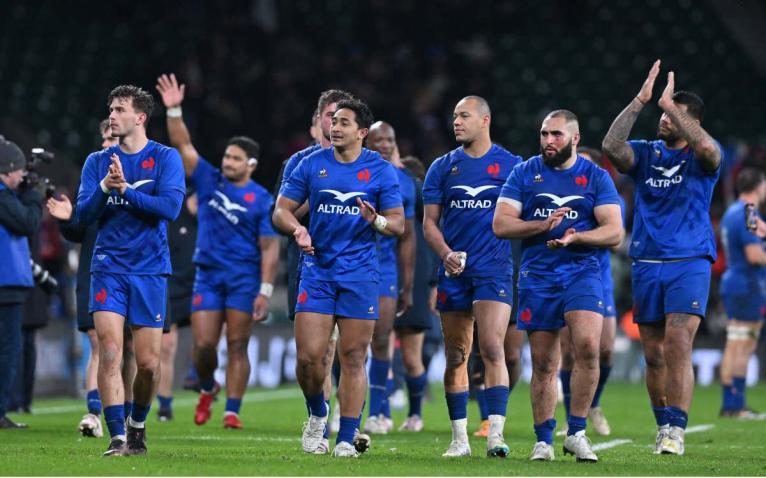Oh, what fun it must have been for French fans to get the train back into London on Saturday evening. You can keep your Waterloo, because we’ve now got our Twickenham.
In truth it wasn’t much of a battle. More a massacre. For the first time in their 113-year history, England shipped fifty points at their HQ
In a post-match interview, France’s team manager Raphaël Ibañez rated the 53-10 victory as one the best performances by a French side at Twickenham. With all due respect, Monsieur Ibañez, it was without a doubt the best. Nothing else comes close, not even France’s stirring second-half comeback against the All Blacks in the 1999 RWC semi-final.
The hammering was the lead item on France’s primetime TV news and the presenter could hardly believe what he was saying. England had not just been beaten, they had been blown away. A reporter at Twickenham interviewed some of the French fans as they left the stadium; their emotions ranged from bewilderment to ecstasy.
The headline in Sunday’s L’Equipe under a photo of the outstanding Thibaud Flamant scoring the second of his two tries was, in English, ‘God Save The Kings!’. The first nine pages of the sports daily were devoted to the victory, including an interview with Yannick Bru. ‘It’s almost too good to be true,’ said Bru. ‘We must make the most of this moment because England have never had 50 points put past them at Twickenham.’
Bru, who won 18 caps for France two decades ago, was one of France’s coaches during Philippe Saint-Andre’s ill-fated reign. Indeed, there are similarities between where England are today and where France were in 2015.

I was in Cardiff when France were thrashed 62-13 by the All Blacks in the World Cup quarter-final that year. The gulf in skill and power was as marked that day as it was between England and France on Saturday. So, too, was the body language at the end of the match. I remember the French players trooping off the pitch, broken in spirit and body. England looked shell-shocked as they staggered down the tunnel at Twickenham. Dublin on Saturday will be some test of character for Steve Borthwick’s side.
There is a case for saying that France’s victory on Saturday was the most significant in their history. There have of course been several unforgettable performances by French times down the years; most have come in World Cups, and most have been one-offs, such as their semi-final victories in 1987 and 1999, followed a week later by a crushing anti-climax in the final. The significance of Saturday’s win was in its brilliance, sustained over 80 minutes, after three matches where France had looked a little stale, and also the venue.
There is a lot of joy, pleasure, emotion. It’s moving because we know that this place, this mythical stadium, is a hard place to win…it’s perfect, a perfect day.’
Fabien Galthie
France had last won at Twickenham in the Six Nations in 2005. England have been their bogey team this century, knocking them out of the World Cup semis in 2003 and 2007, and crushing their self-belief in the process. Several players – François Michalak, Clement Poitrenaud, Nicolas Brusque, Aurelien Rougerie – never fully recovered their confidence, internationally, at least, after the 2003 defeat, which was also the last of Fabien Galthié’s 64 caps.
Galthié had to fight back tears on Saturday evening as he described what the win meant for France. “There is a lot of joy, pleasure, emotion,’ he told reporters. “It’s moving because we know that this place, this mythical stadium, is a hard place to win…it’s perfect, a perfect day.’

It was a near perfect performance from France. Indeed, the Daily Telegraph marked Thomas Ramos 10/10, saying the full-back ‘didn’t put a foot wrong’. The official player of the match did once, missing a touchline conversion, but it was an otherwise meticulous display from Ramos. France have a number of fine full-backs – Melvyn Jaminet, Brice Dulin, Max Spring and Anthony Bouthier – but Ramos has made the position his own through self-discipline and maturity. ‘On a rugby field I have fun,’ said Ramos post-match. ‘I love it and I don’t want to be a sterile player, placed in a box from which he doesn’t move. I like to be free, to be able to make quick decisions, even under pressure. Boldness is what I was taught when I arrived as a youngster at Toulouse.’
At the start of his reign, Galthié doubted that Ramos had the ability to adapt his natural flamboyance to the disciplined and pragmatic kicking game introduced by Shaun Edwards.
It was the back-row where the game was won with the French trio of Charles Ollivon, François Cros and Grégory Alldritt dominating England’s loose forwards offensively and defensively.
‘That’s been the hardest sell, because I don’t think the French lads had a structured kicking game before,’ explained Edwards during the 2022 Six Nations. ‘But now, they’re realising that they’re good at running the ball but they can’t do it all the time.’
No one realises it more than Ramos. ‘I learned to listen to what they were asking of me in certain situations,’ he said. ‘I’ve shown that I am capable of changing.’
But it was the back-row where the game was won with the French trio of Charles Ollivon, François Cros and Grégory Alldritt dominating England’s loose forwards offensively and defensively. They bossed the breakdown and had a hand in four of the Bleus’ seven tries. The ability of Ollivon and Alldritt to offload out of the tackle is a skill that eludes their English counterparts. Perhaps the most revealing stat from Saturday’s match was that France notched up eleven offloads to England’s three.

It was France’s sixteenth victory in seventeen matches but without doubt it was the most accomplished; beating the All Blacks and the Springboks is always to be savoured but these were victories in November internationals, against sides that were on tour and coming to the end of their season. England were at full-strength, ‘up for it’, so we had been led to believe, under their new coach and captain, and with Marcus Smith installed at fly-half. In an interview with a French paper last week, World Cup winner Will Greenwood predicted that ‘England will crush France!’
France wants to achieve something great. They did that on Saturday against England, and it may prove to be the win that gives the Bleus the belief that 2023 is their year.
Philippe Sella
Greenwood belonged to a generation of English players who made life a misery for France; between 1999 and 2003 England won six of their eight encounters, including that RWC semi-final and two thumping 40 point victories at Twickenham. Unsurprisingly, some of the Frenchmen from that era have been unable to resist gloating. England ‘didn’t get off the team bus,’ Imanol Harinordoquy joked to Midi Olympique, while the same paper also carried an interview with Richard Dourthe, who described the win as the best result of Fabien Galthié’s reign because it was at Twickenham, scene of some of the ‘biggest heartaches’ of his career.
The distinguished Philippe Sella also experienced some wretched afternoons at Twickenham during his 111-cap career, and he arrived with a group of friends on Saturday fearing ‘a reaction’ from England. Instead it was an ‘afternoon of happiness’ and he left the stadium, like every other French fan, in dreamland.
‘France wants to achieve something great,’ he said. They did that on Saturday against England, and it may prove to be the win that gives the Bleus the belief that 2023 is their year.


Thanks for the background to the French win, in this and other articles in your pages. I heard someone from the English rugby set-up on Radio 5 Live saying the result last Saturday was just about the English lacking fight. Seems there was much more to it.